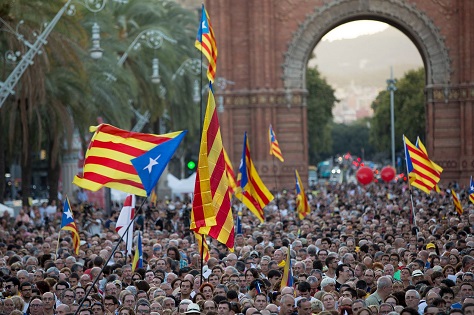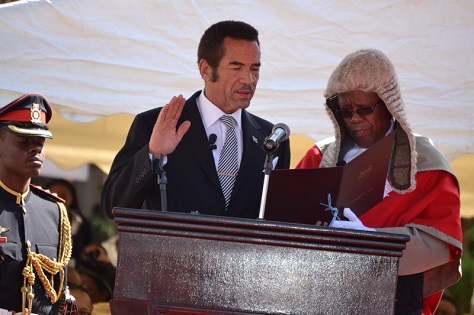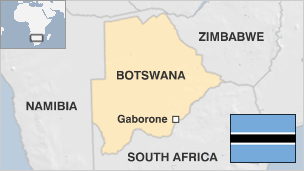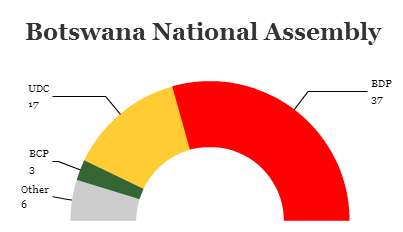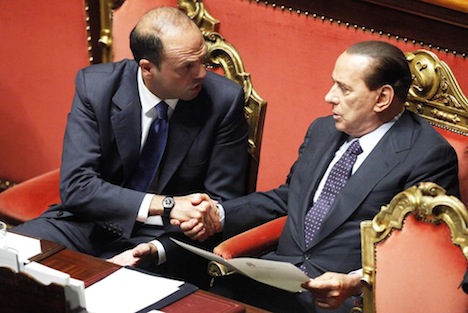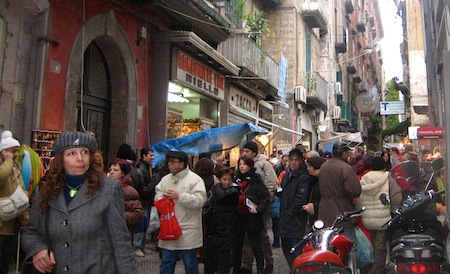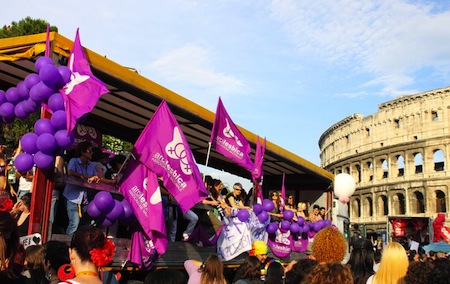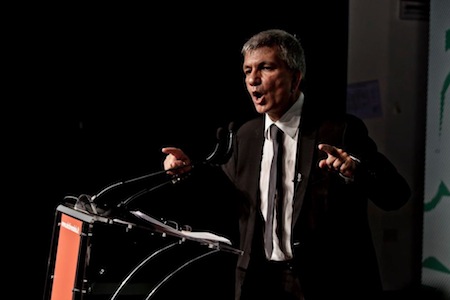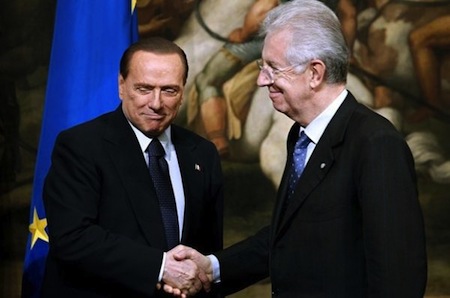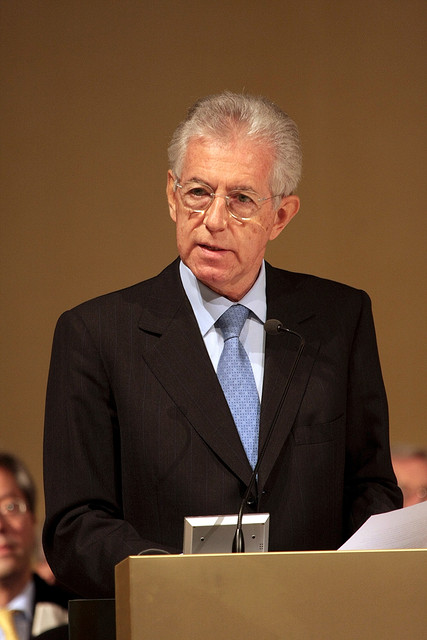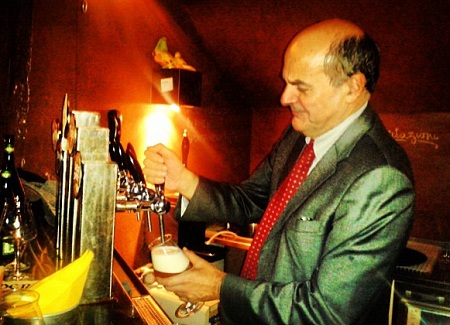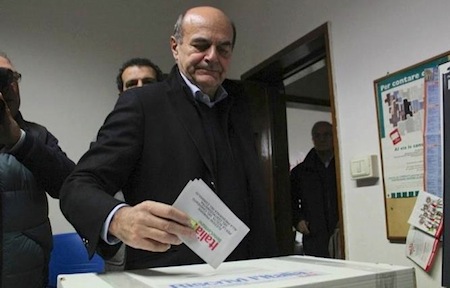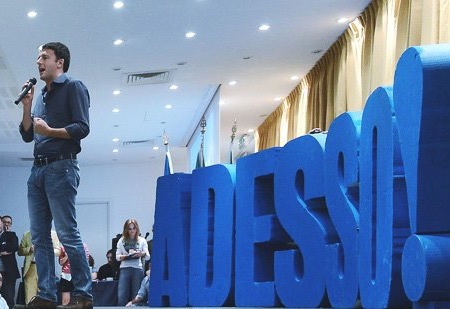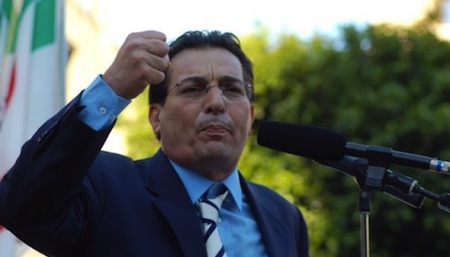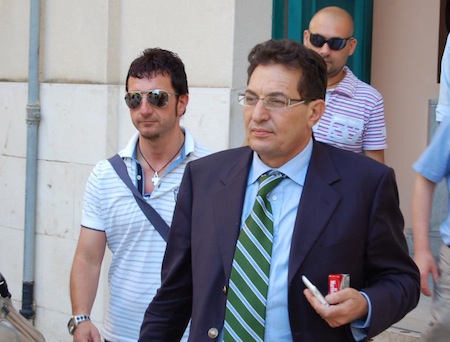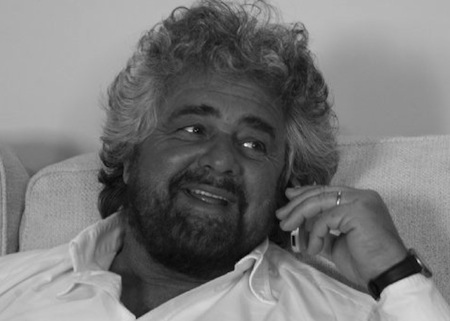
UPDATE, 7:30 p.m.: Here’s an additional piece on where Italy goes from here — a look at four potential outcomes to watch for in the days ahead.
* * * * *
The election results from Italy’s general election have largely been counted, and they’re backing up the exit polls (not the initial instant polls from the preceding hours leading up to the election) that show a hung parliament — leaving the short-term future of Italy’s government unclear.
Right now, it certainly looks like Pier Luigi Bersani’s centrosinistra (center-left) coalition will win a majority in the elections for Camera dei Deputati (House of Deputies), Italy’s lower house, while former prime minister Silvio Berlusconi’s centrodestra (center-right) coalition will win a majority in the elections for Italy’s upper house, the Senato (Senate).
Nonetheless, the big winner is the Movimento 5 Stelle (M5S, the Five Star Movement), the protest group of blogger and comedian Beppe Grillo (pictured above), which has significantly outperformed polling expectations and may well become the single largest ‘party’ in the Italian parliament.
Bersani leads in Italy’s lower house
In the 630-member lower house, the latest projections show Bersani’s centrosinistra with a small lead of around 29% or 30% to just 28% or 29% for the centrodestra, and a whopping 25% or 26% for the Five Star Movement. Far behind in fourth place is prime minister Mario Monti’s centrist coalition with around 11%. The communist, green, anti-corruption Rivoluzione Civile (RC, Civil Revolution) headed by antimafia magistrate Antonio Ingroia has won barely over 2%.
If that result holds, it means Bersani will command an automatic majority in the lower house — the winner of the largest share of the votes wins 54% of the seats in the Camera dei Deputati, so Bersani is likely to hold 340 seats.
Berlusconi leads in Italy’s upper house
In the Senato, however, seats are awarded proportionally on a regional basis, with a regional ‘bonus’ — the winner of the largest share of the votes in each region automatically wins 55% of the seats in that region.
It’s too soon to tell whether Bersani or Berlusconi will win the greater number of votes nationally in the senatorial elections, but it’s likely that Berlusconi may emerge with the greatest number of the 315 seats up for election today (though far short of a majority) — the latest projections show the centrodestra with 114 seats, the centrosinistra with 113 seats, the Five Star Movement with 57 and Monti’s coalition with 17.
Berlusconi wins Piedmont, sweeps southern Italy in senatorial elections
When you look at the results region-by-region, you begin to see just how amazing the comeback has been for Berlusconi.
Right now, it appears that Berlusconi’s coalition has not only won Piedmont and Veneto in northern Italy, but also Lombardy, Italy’s most-populous region, by what appears to be a whopping 38.0% to 29.5% victory. That doesn’t bode well for the centrosinistra in regional elections in Lombardy, where the centrodestra is trying to hold onto power under its candidate for regional president, Roberto Maroni, since 2012 the national leader of the Lega Nord (Northern League). Maroni faces a tough challenge from the leftist candidate, Umberto Ambrosoli. Exit polls showed a very close regional race.
In southern Italy, where the centrosinistra was hoping to break through with a credible chance at sweeping the south, Berlusconi’s coalition has apparently won each region, excepting Basilicata. That includes Campania and Sicily, Italy’s third- and fourth-most populous regions, respectively. Berlusconi leads 37.2% to 29.1% in Campania and by 33.2% to 27% in Sicily (where Grillo’s Five Star Movement, not typically strong in the south, won 29.5%). It also includes Puglia, the home of twice-elected regional president Nichi Vendola, the leader of the socialist Sinistra Ecologia Libertà (SEL, Left Ecology Freedom) that is part of Bersani’s coalition. Although SEL won nearly 7% in Puglia, its best result nationwide, it wasn’t enough to power the centrosinistra to victory, where it was trailing with 28.3% to the centrodestra‘s 34.5%.
Grillo is the biggest winner, Monti the biggest loser
All in all, the result is a victory for Grillo — his movement outpolled Berlusconi’s party (though not his broader coalition), the Popolo della Libertà (PdL, People of Freedom) and it’s still too soon to tell, but there’s a chance the Five Star Movement outpolled Bersani’s party, the Partito Democratico (PD, Democratic Party) as well.
Going down the list of senatorial results, it looks like the Five Star Movement outpolled both the PD and the PdL in Veneto in the northeast, Liguria in the northwest, Marche, Abruzzo and Molise in the center of Italy, and Sicily and Sardinia as well, with Grillo’s movement winning around 30% in some of his strongest regions.
Monti, by contrast, appears to have finished in fourth place — and a far-off fourth place — in every region. Despite his alliance with the Christian Democrats — long-dominant in Italy’s south — Monti polled worst in Italy’s south, and did best (winning double digits of up to 12%) in the northern industrial regions like Piedmont, Lombardy, Friuli and Veneto.
That means that, even if they could find a way to build a coalition, Monti and Bersani are unlikely to have sufficient strength in Italy’s upper house to form a coalition.
Other winners and losers Continue reading Making sense of today’s Italian election results →
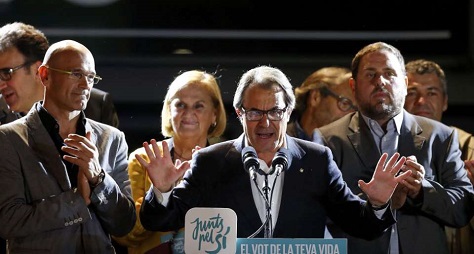
![]()
![]()


